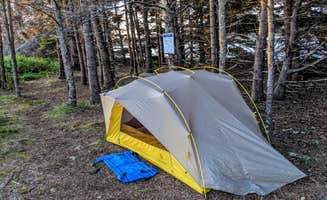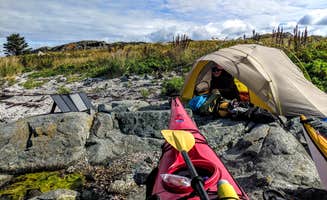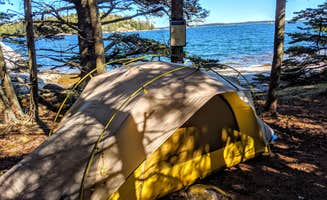Dispersed camping near Pemaquid, Maine offers primitive outdoor experiences primarily on remote islands in the Gulf of Maine. The Deer Isle Archipelago serves as a gateway for boat-in wilderness camping with most sites managed through the Maine Island Trail Association (MITA). Campers need to bring all supplies including drinking water, waste disposal bags, and weather-appropriate gear as the islands have limited natural protection from coastal weather patterns.
What to do
Island hopping exploration: Many kayakers use the island campsites as waypoints for multi-day paddling adventures. The proximity to Isle au Haut, a remote section of Acadia National Park, makes Wheat Island an excellent base camp. "Perfect island for exploring the close-by Isle au Haut, a remote section of Acadia National Park, but very hard to get reservations at Duck Harbor Campground," notes one MITA member.
Beach combing: The shorelines of these islands often contain unique geological features and marine artifacts. Doliver Island offers a "Gorgeous shell covered beach and a beautiful view of Isle au Haut, just next door," according to one visitor who used it as a strategic stop during a longer journey.
Wildlife observation: The islands provide habitat for coastal bird species, marine mammals, and intertidal creatures. Early mornings and evenings offer prime viewing opportunities when wildlife is most active. Bring binoculars for distant spotting of pelagic birds, seals, and occasional porpoises in the surrounding waters.
What campers like
Strategic positioning: The islands serve specific purposes for paddlers planning multi-day trips. "Doliver Island is small with barely a tent space, but a good stop for us on our 9 day journey and a perfect launching spot for crossing Jericho Bay (4.5 miles) to Marshall Island the next day," shares one experienced kayaker.
Ease of access for beginners: Not all island landings require advanced kayaking skills. Buckle Island provides "a perfect island for those new to sea kayak camping as the sandy shore, which is exposed for a good portion of the day, is easy to land on and a short walk to a trail into the woods." This accessibility makes it ideal for those gaining experience with sea kayaking.
Celestial viewing: The minimal light pollution on these remote islands creates exceptional stargazing conditions. Wheat Island campers report memorable night sky viewing, with one noting their campsite provided "a gorgeous view of the sun setting and full moon rising" during their September stay.
What you should know
Insect preparation: Mosquitoes remain persistent even outside peak summer months. Multiple campers warn about evening insects, with one Doliver Island visitor noting, "We thought we were passed mosquito season in early September, but alas, they were pretty bad all day long." Bring appropriate repellent and protective clothing.
Landing conditions: Tide schedules significantly impact landing feasibility and safety. Wheat and Doliver Islands present particular challenges during high tides. Plan arrivals according to tide schedules and understand that weather conditions can change rapidly in this area.
Membership requirements: While these dispersed campsites are free to use, they require MITA membership for access. Annual memberships support conservation efforts and provide detailed information about landing points, site locations, and specific rules for each island.
Tips for camping with families
Site selection: Choose islands with adequate space for multiple tents if camping with children. Wheat Island offers options based on group size, with "one very small one on the northeast side, the other perfect for larger groups on the southwest side."
Supply planning: With no facilities available, families need comprehensive packing plans. Children require additional water supplies, and waste management becomes more complicated with larger groups. Pack multiple waste disposal bags and teach proper leave-no-trace practices before arrival.
Safety considerations: Establish clear boundaries for children on these small islands. Rocky shorelines can be slippery, and changing tides may alter safe play areas. Bring marine radios for emergency communication as cell service is often limited or nonexistent.
Tips from RVers
Mainland base camps: RV travelers can establish mainland base camps and arrange boat shuttles to the islands for day trips. Several campgrounds on the mainland near Stonington and Deer Isle offer RV accommodations with water and electrical hookups.
Equipment storage: When transitioning from RV to boat-in camping, secure storage for RV-specific equipment becomes necessary. Some local marinas offer secure parking and storage options for visitors exploring the islands by kayak or small boat.




